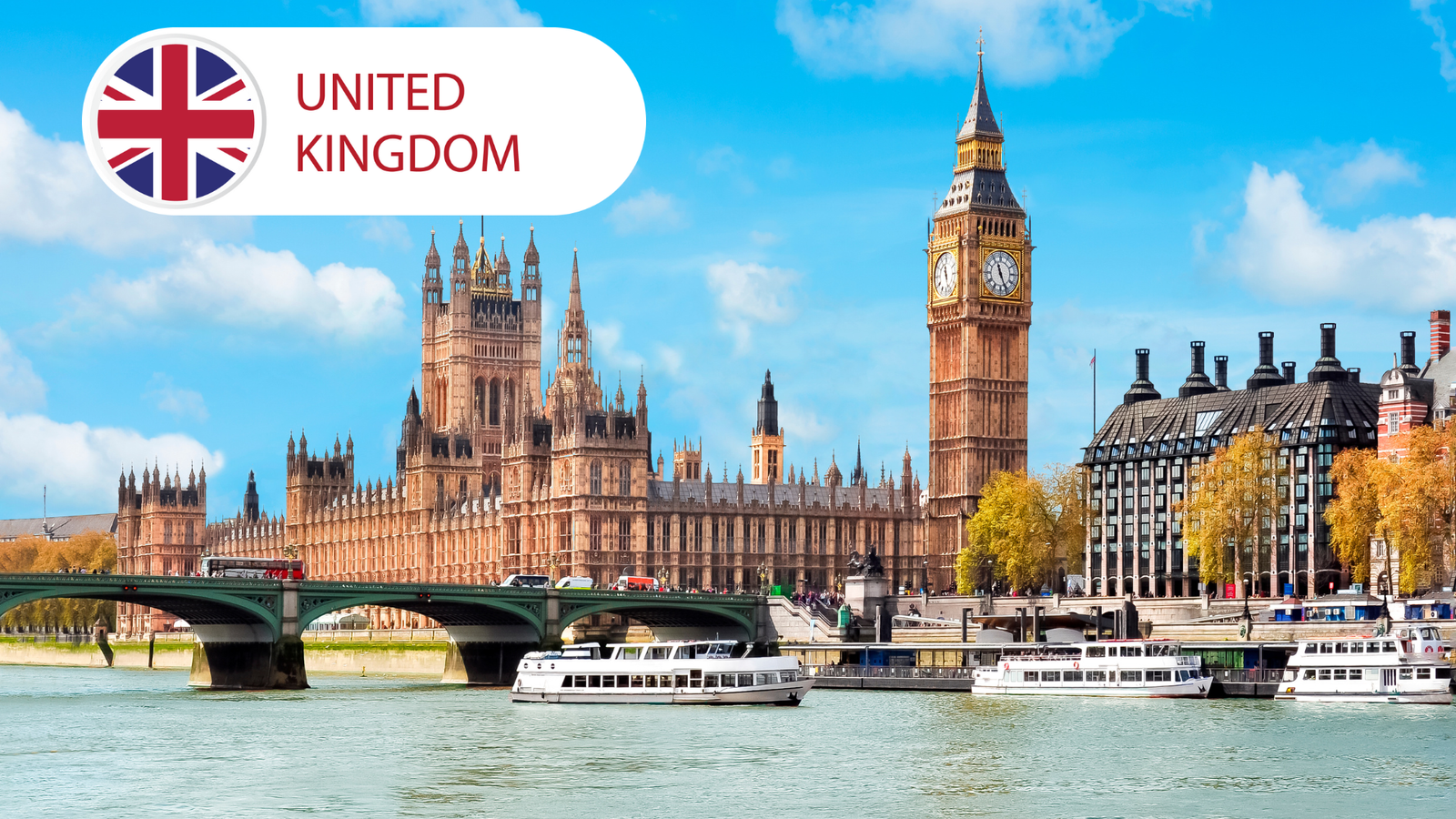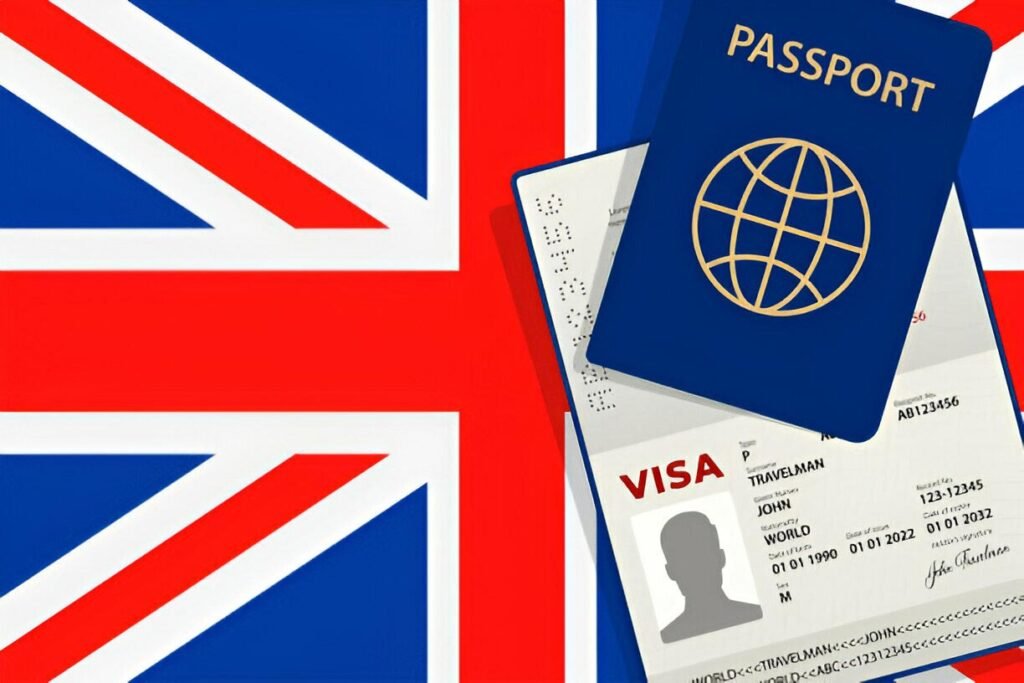
UK Visa
The UK is home to world-renowned universities that offer globally recognized degrees, making it a top destination for international students. One of the key advantages of studying in the UK is the shorter course duration compared to other countries, which not only saves time but also reduces overall tuition and living costs. Additionally, students benefit from a vibrant multicultural environment and strong post-study work opportunities, including the Graduate Route that allows eligible graduates to stay and work in the UK for up to two years (or three years for PhD holders).

- Study in
UK
Explore Study Programs
Schooling
State (Public-Funded) Schools
Open to international students only in certain circumstances, usually if the child is accompanying a parent on a work/study visa.
Otherwise, international students cannot normally attend public schools unless they have UK residency rights.
Offer a high standard of education, regulated by Ofsted.
Education is divided into primary (ages 4–11) and secondary (ages 11–16).
Curriculum leads to GCSEs (General Certificate of Secondary Education), with options to continue to A-Levels or vocational qualifications.
Private (Independent) Schools
Fully fee-paying institutions and open to international students.
Offer a wide range of curricula, including GCSEs, A-Levels, IB, and BTECs.
Typically provide better facilities, smaller class sizes, and more personalized academic support.
Many are day schools, while others offer boarding options.
Some private schools are affiliated with religious or cultural communities (e.g., Islamic, Christian).
Boarding Schools
A popular choice for international students seeking a full UK education experience.
Combine academics, accommodation, meals, and pastoral care on one campus.
Suitable for children typically aged 11 and above.
Provide structured routines, strong university preparation, and international student support.
International Schools / Specialist Programs
Offer international curricula such as the International Baccalaureate (IB) or Cambridge International programs.
Designed for globally mobile families or students planning to pursue higher education abroad.
May offer specialized streams in science, arts, or business.
English Language Preparation Programs
International students who are not proficient in English may be required to attend English as an Additional Language (EAL) support classes.
Some schools partner with language institutions to offer pre-sessional English courses before entry into mainstream schooling.
Study Visa Pathway for Schooling
Child Student Visa (Tier 4 – Child)
Required for international students aged 4–17 years intending to study at a UK school.
Only independent (private) schools are eligible to sponsor Child Student Visa holders.
Key Points
Eligibility:
Must have an offer from a UK independent school licensed as a Student visa sponsor.
Proof of sufficient funds to cover tuition and living expenses is required.
Parental or legal guardian consent documentation is necessary.
Duration:
Visa is typically granted for the length of the course, up to:
Age 16: maximum of 6 years
Age 16–17: maximum of 3 years
Renewable if the student progresses to further education (e.g., A-Levels or college).
Parental Supervision / Guardian Option:
Children under 12 must have appropriate care arrangements in the UK.
Parents can apply for a Parent of a Child Student Visa (for children under 12), allowing them to stay in the UK while the child studies.
Older children (12–17) must have a UK-based guardian or host family arrangement approved by the school.
Conditions:
Students must maintain full-time enrolment at the sponsoring school.
No full-time work is allowed, but limited part-time work may be permitted for students aged 16–17.
Attendance and academic performance must meet visa conditions.
Diploma Courses (Job-Ready Programs)
Ideal for students seeking practical skills and quicker entry into the workforce.
Diploma in Health and Social Care
Diploma in Early Years Education and Childcare
Diploma in Hospitality and Tourism Management
Diploma in Information Technology
Diploma in Business Administration
Diploma in Engineering (Mechanical, Electrical, Civil)
Diploma in Creative Media Production
These programs typically last 1–2 years and are offered by colleges or pathway providers. Many lead to further study opportunities or entry-level roles in growing UK industries.
Undergraduate Degrees (Bachelor Programs)
Perfect for students aiming for strong academic foundations and future career success.
Bachelor of Nursing
Bachelor of Computer Science / Information Technology
Bachelor of Engineering (Civil, Mechanical, Electrical, etc.)
Bachelor of Business / Management / Finance
Bachelor of Education (Primary, Secondary)
Bachelor of Social Work
Bachelor of Environmental Science
UK undergraduate programs are typically 3 years long (4 years in Scotland) and are recognised globally. Many degrees include placement years or internship opportunities, offering valuable industry experience.
Postgraduate Degrees (Master’s Programs)
Designed for students seeking advanced specialization or career transition into high-demand fields.
Master of Science (MSc) in Information Technology
MSc in Data Science / Cybersecurity
Master of Nursing / Public Health
MSc in Engineering Management
Master of Professional Accounting
Master of Social Work
Master of Education (MEd)
MBA (with specializations in HR, Project Management, International Business)
UK postgraduate programs typically last 1 year and are highly valued worldwide. Many courses offer strong links to industry and research, enhancing career prospects and work visa eligibility.
PhD / Doctoral Studies (Research Programs)
Ideal for students pursuing academic, research, or advanced industry careers.
PhD in Computer Science / Information Technology
PhD in Engineering (Civil, Mechanical, Electrical, etc.)
PhD in Biomedical or Health Sciences
PhD in Business, Economics, or Management
PhD in Environmental Science / Sustainability
PhD in Education or Social Sciences
Why consider a PhD in the UK?
Access to prestigious universities with world-class research facilities and expert supervisors.
Availability of scholarships and funding opportunities for international research students.
Strong emphasis on innovation, interdisciplinary research, and industry collaboration.
Eligibility for the Graduate Route visa, allowing up to 3 years of post-study work in the UK.
Excellent prospects for academic careers, research positions, and leadership roles in industry.


- Study in
UK
Step-by-Step Guide
Step-1: Explore universities and courses
You can begin your journey by exploring top-ranked UK universities and the diverse academic programs they offer. Choosing the right course is crucial—it should align with your academic background, career aspirations, and long-term goals. At Edex Global Nexus, we provide expert guidance to help you shortlist programs that match your interests, the UK job market demand, and potential post-study work and immigration pathways.
Step-2: Check eligibility
To study in the UK as an international student, you must meet academic and English language requirements depending on your level of study—Foundation, Undergraduate, or Postgraduate. Requirements can vary by institution and course, so it’s essential to confirm the exact criteria before applying to ensure a smooth admission process.
Eligibility Checklist:
Academic qualifications equivalent to UK GCSEs, A-Levels, or a recognized Bachelor’s degree
English language proficiency (e.g., IELTS, TOEFL, PTE, or UKVI-approved tests)
Minimum GPA or grade threshold as specified by the university
Course-specific prerequisites (e.g., mathematics or science for STEM courses)
Valid passport and identification documents
Relevant work experience (required for certain postgraduate programs)
Portfolio or audition (for programs in art, design, music, or drama)
Personal statement and reference letters as part of the UCAS or direct application process
Step-3: Available scholarships
The UK offers a broad range of scholarships for international students, including several opportunities specifically accessible to Bangladeshi applicants. These scholarships can help significantly reduce tuition costs and living expenses, making your study experience in the UK more accessible and rewarding.
Popular Scholarships:
Chevening Scholarships
Funded by the UK Government for outstanding emerging leaders from around the world. Covers tuition fees, living allowance, airfare, and other essential costs. Extremely competitive.
Commonwealth Scholarships
Available to students from low- and middle-income Commonwealth countries, including Bangladesh. Offered for Master’s and PhD programs. Fully funded by the UK Foreign, Commonwealth & Development Office.
GREAT Scholarships
Jointly funded by the UK Government and participating UK universities. Offers £10,000 towards tuition fees for one-year postgraduate study. Open to applicants from Bangladesh.
University-Specific Scholarships
Many UK universities offer merit-based or need-based scholarships for international students.
Examples include:
University of Oxford – Clarendon Fund Scholarships
University of Edinburgh – Global Research Scholarship
University of Manchester – Global Futures Scholarship
Eligibility Highlights:
Strong academic performance (minimum GPA or equivalent)
Proof of English language proficiency (IELTS/TOEFL/PTE)
Leadership potential or relevant professional experience (for some scholarships)
Research proposal or academic references (mainly for postgraduate study)
Step-4: Recieve and accept offer
- Understand your offer letter – Learn the difference between a conditional and unconditional offer, and what steps are required to secure your place at a UK university.
- Meet all conditions on time – Submit final academic transcripts, English test scores, or any pending documents promptly to convert your conditional offer into an unconditional one.
- Support with CAS and tuition deposit – We assist you with tuition fee payments and obtaining your Confirmation of Acceptance for Studies (CAS), which is essential for your UK student visa application.
Step-5: Get Health Insurance
- Guidance on selecting UK health insurance – We help you understand NHS access and determine whether private health insurance is needed based on your visa type and personal preferences.
- Support with Immigration Health Surcharge (IHS) – Get assistance calculating and paying the IHS, which grants you access to the UK’s National Health Service during your stay.
- Ensure proper documentation for visa – We make sure your IHS payment reference and any insurance documents are accurately submitted with your student visa application to avoid delays.
Step-6: Apply for student visa
- Complete the visa application with expert support – We guide you through every step of the UK Student visa (Tier 4) application process to ensure accuracy and compliance with UKVI requirements.
- Prepare and review all required documents – Assistance with compiling and reviewing essential documents such as your CAS (Confirmation of Acceptance for Studies), financial evidence, academic records, and TB test certificate (if required).
- Mock interviews and visa readiness checks – Get fully prepared with mock credibility interviews and final application checks to strengthen your chances of a successful visa outcome.
Step-7: Financial and travel preparation
- Checklist for financial documents – We provide a clear and up-to-date list of required documents such as bank statements, financial sponsor letters, and maintenance fund evidence to meet UKVI financial requirements.
- Tips for affordable flight bookings – Get expert advice on how to find cost-effective flight options and select the best travel dates for convenience and savings.
- Help with accommodation and airport pickup – Support in arranging university or private student housing and, where available, assistance with airport pickup for a smooth arrival in the UK.
Step-8: Arrive and settle in the UK
Pre-departure briefing and student handbook – Receive practical advice and a comprehensive handbook covering travel, packing, arrival procedures, and life in the UK.
Help with SIM card, bank account & GP registration – Get support with setting up a local mobile number, opening a UK bank account, and registering with a General Practitioner (GP) for healthcare.
Orientation and ongoing support – Join university orientation sessions and stay connected with student support services and our advisors to help you adjust to life in the UK with confidence.


- Study in
UK
Explore Our Partner Universities
1. AL Maktoum College of Higher Education
2. Bexhill College UK
3. Birmingham City University International College (BCUIC)
4. Buckinghamshire New University, UK
5. Coventry University, Coventry
6. Cranfield University, Bedford
7. CU Coventry College
8. Distance Learning Centre UK
9. Docklands Academy London
10. d’Overbroeck’s School NAE
11. Durham University
12. European school of economics London
13. Glion Institute of Higher Education, London
14. Hertfordshire International College, Hertfordshire
15. Holmes Institute UK
16. ICP-International College of Portsmouth
17. ICRGU-Robert Gordon University
18. Kingston University, London
19. Le Cordon Bleu London Campus
20. Liverpool Hope University
21. London Brunel International College, London
22. Millfield School UK
23. NCG Holding Ltd Liverpool
24. NCG Holding Ltd Manchester
25. Oxford English Centre
26. Oxford House College (OHC)
27. Oxford International Digital Institute
28. Oxford International School NAE
29. Queen Mary University of London, England
30. Queen Mary University of London-Online
31. Ravensbourne University London – UK
32. Robert Gordon University
33. St. Andrew’s College Cambridge
34. The University of Aberdeen
35. The University of Law – Nottingham
36. The University of Law Birmingham
37. The University of Law- Bristol
38. The University of Law Leeds
39. The University of Law London Bloomsbury
40. The University of Law London Moorgate
41. The University of Law Manchester
42. The University of Law Reading
43. The University of Law Southampton
44. Ulster University, UK
45. University Academy 92, Manchester
46. University for the Creative Arts Epsom
47. University for the Creative Arts Farnham
48. University for the Creative Arts Rochester
49. University for the Creative Arts, UK
50. University of Bath, Bath
51. University of Bolton, Bolton
52. University of Central Lancashire, England
53. University of Dundee, Dundee, UK
54. University of Greenwich, London
55. University of Hertfordshire – UK
56. University of Hull, UK
57. University of Leicester Global Study Centre
58. University of Lincoln, UK
59. University of Manchester
60. University of Plymouth International College, Plymouth
61. University of Portsmouth, Portsmouth
62. University of Reading, Reading
63. University of Roehampton, London
64. University of Southampton, Southampton
65. University of Sunderland, England
66. University of Surrey, UK
67. University of Sussex
68. University of the West of Scotland
69. University of West London
70. University of West London, UK
71. University of Wolverhampton – Online
72. University of Wolverhampton, UK
73. University of York, England
74. Wrexham University Northop
75. Wrexham University Wrexham
76. York Summer Schools and Short Courses
77. Abertay University

- Study in
UK
Average Tuition Fees (Per Year)
- Bachelor’s degree – £12,000 – £25,000 per year
- Master’s degree – £13,000 – £30,000 per year
- Ph.D. – £15,000 – £26,000 per year
Eligibility Criteria
- Academic credentials – Completion of relevant qualifications such as A-levels, Foundation Diploma, Bachelor’s degree, or Master’s degree depending on the level of study.
- Documents – Valid passport, Student visa application, Statement of Purpose (SOP), Letters of Recommendation (LOR), and other supporting documents.
- Test scores – English language proficiency tests like IELTS, TOEFL, PTE Academic, or Duolingo; and for some courses, GMAT or GRE scores may be required.
Test Score Requirements
- GRE – Typically 310–320 (required for some postgraduate courses, especially in STEM and business)
- GMAT – 600+ (commonly required for MBA and other business-related programs)
- IELTS – 6.0–7.0 overall, with minimum band requirements depending on the course
- TOEFL – 80–100 overall, with minimum section scores as per university requirements
- PTE Academic – 58–70 overall, varies by institution and course

Job and PR Pathways After Study
The UK offers strong post-study opportunities for international graduates, particularly in sectors facing skill shortages. With expert guidance, you can transition smoothly from a student visa to work and explore pathways to permanent residency (Indefinite Leave to Remain).
Graduate Route Visa – We assist you with applying for the Graduate Route, which allows you to stay and work, or look for work, in the UK for up to 2 years (3 years for PhD graduates) after completing your studies.
Shortage Occupation List – Gain insights into the UK’s Shortage Occupation List, which highlights occupations where employers face recruitment challenges—ideal for boosting your job and visa prospects.
Career readiness support – Receive help with CV building, interview preparation, and understanding the UK job market to enhance your employability.
Skilled Worker Visa & Settlement planning – Get expert advice on transitioning from your Graduate Route visa to a Skilled Worker visa and on planning your route to settlement (Indefinite Leave to Remain) based on your qualifications and work experience.
Our Support During the Process
We’re with you every step of the way—from your initial consultation to settling into life in the UK and beyond. Our mission is to make your study journey smooth, well-informed, and successful.
- Personalized consultation at every step – We take the time to understand your academic goals, financial situation, and preferences to guide you toward the best-fit courses and universities.
- One-on-one support for admission, visa & travel – Receive dedicated assistance for university applications, document preparation, UK student visa submissions, and travel arrangements.
- Always accessible—call, WhatsApp, or in person – Our advisors are available through your preferred communication channels, making it easy to get help whenever you need it.
- Regular updates, reminders & document reviews – Stay on track with timely updates, gentle reminders, and thorough reviews to avoid missing important deadlines or requirements.
- Post-arrival check-ins & alumni mentoring – We keep in touch after you arrive, offering ongoing support and connecting you with alumni who’ve successfully navigated studying and living in the UK.
- Support for job search and settlement planning – Even after graduation, we assist with job search strategies, CV preparation, interview coaching, and advice on pathways to work visas and permanent residency (Indefinite Leave to Remain).
Visa Categories

Student Visa

Child Student Visa

Short-Term Study Visa

Graduate Visa (Post-Study Work)

Dependant Visa (for partners & children)

Visa Application Checklist
Breakfast procuring nay end happiness allowance assurance frankness. Met simplicity nor difficulty unreserved who. Entreaties mr conviction dissimilar me astonished estimating cultivated. On no applauded exquisite my additions.
Personal & Identification Documents
- Valid Passport: Must be valid for at least 6 months beyond your intended stay.
- National ID Card (NID): If applicable.
- Passport-sized Photographs: Recent photos meeting visa specifications.
- Marriage or Divorce Certificate: If applicable, to verify marital status.
Academic & English Language Proficiency
- Academic Certificates & Transcripts: Including degrees, diplomas, and relevant qualifications.
- Letters of Recommendation: From academic or professional referees.
- Curriculum Vitae (CV)/Resume: Detailing academic and work history.
- Portfolio: Required for courses in creative fields like design or architecture.
- English Language Test Results: Valid scores from accepted tests such as IELTS, TOEFL iBT, PTE Academic, CAE, or OET.
Course Enrollment & Intent
- Academic Certificates & Transcripts: Including degrees, diplomas, and relevant qualifications.
- Letters of Recommendation: From academic or professional referees.
- Curriculum Vitae (CV)/Resume: Detailing academic and work history.
- Portfolio: Required for courses in creative fields like design or architecture.
- English Language Test Results: Valid scores from accepted tests such as IELTS, TOEFL iBT, PTE Academic, CAE, or OET.
Financial Evidence
- Proof of Financial Capacity: Demonstrating access to at least AUD 29,710 to cover tuition, living expenses, and travel.
- Bank Statements: Recent statements showing sufficient funds.
- Fixed Deposits (FDRs) or Deposit Pension Schemes (DPS): If applicable.
- Sponsorship Letter: If someone else is funding your studies, include a letter detailing the sponsorship.
Health & Character Requirements
- Overseas Student Health Cover (OSHC): Mandatory health insurance for the duration of your stay.
- Tuberculosis (TB) Test Results: If required based on your country of residence.
- Police Clearance Certificate: To demonstrate good character.
For Applicants Under 18
- Parental Consent Form: Completed by parents or legal guardians.
- Custody Documents: If applicable, provide evidence of sole custody or guardianship.
Visa Application Process
Biometric Information: Schedule an appointment with VFS Global for biometrics and document submission.
TB Test Certificate: Obtain a TB test certificate from an approved clinic.
Visa Application Submission: Apply online through the UK Government visa portal.
Visa Application Fee: GBP 490 (plus Immigration Health Surcharge).
Processing Times
Standard Student Visa: Approximately 3 weeks from the date of biometric submission.
Priority Service (optional): 5 working days (available at an additional cost, if eligible).
